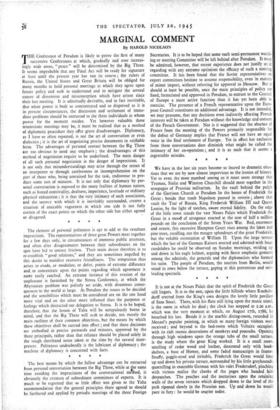The element of personal politeness is apt to add to
the resultant imprecision. The representatives of three great Powers meet together for a few days only, in circumstances of immense public attention, and often after disagreements between their subordinates on the spot have led to uneasy friction. Their main desire therefore is to re-establish " good relations," and they are sometimes impelled by this desire to manifest excessive friendliness. The temptation thus arises to evade, or modulate, or defer, points of extreme difference and to concentrate upon the points regarding which agreement is more easily reached. An extreme instance of this evasion of the unpleasant is furnished by the Stresa Conference, at which the Abyssinian problem was politely set aside, with disastrous conse- quences to the world at large. At Potsdam the issues to be decided and the sensibilities which must be considered are on the one hand more vital and on the other more inflamed than the purposes or feelings which distracted our delegation to Stresa. It is to be hoped, therefore, that the lesson of Yalta will be scrupulously borne in mind, and that the Big Three will stek to decide, not merely the main outlines of their common objectives, but the means . by which these objectives shall be carried into effect ; and that these decisions are embodied in precise protocols and minutes, approved by the three principals, rather than that reliance should be placed solely in the rough shorthand notes taken at the time by the several inter- preters. Politeness undoubtedly is the lubricant of diplomacy ; the machine of diplomacy is concerned with facts.


























 Previous page
Previous page